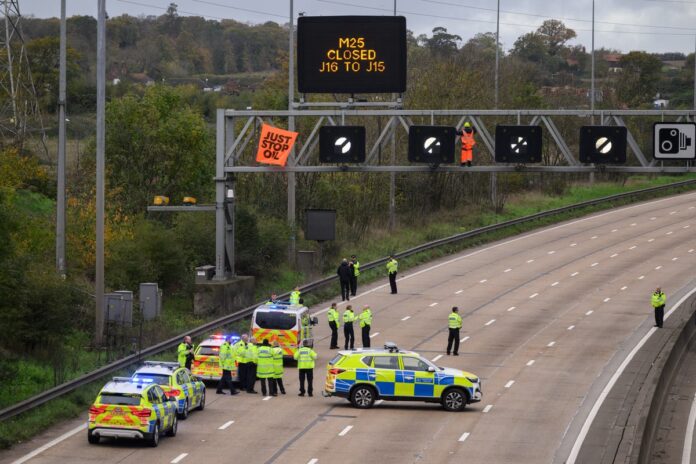If you’re not worried yet about police officers arresting journalists covering Just Stop Oil protests on British roads, you should be. Because it has nothing at all to do with the ‘media bubble’ or your social media echo chamber. It isn’t a natural continuation of the ‘blue tick’ hierarchy of Elon Musk’s Twitter takeover; or some continuum of the worrying denigration of ‘the expert’ as seen under Trump; or ‘the mainstream media is lying to us’ claims of the Covid denial anti-vaxxer movement. This is about the beginning of the end of democracy itself. It’s that serious – and (journalists or not) we should all be extremely worried about it. We’ve already seen the Conservative government’s attempts to push through a deeply worrying, authoritarian package of laws contained within the Public Order Bill, which is currently going through parliament – including powers to ban people from protesting, criminalise ‘locking on’ and stop and search protesters without suspicion. The home secretary, Suella Braverman, in talking about the Just Stop Oil protests this week, called for officers to take harsher action against activists and said it was their ‘duty to take a firmer line to safeguard public order’.And now this: three journalists arrested for simply doing their jobs. Rich Felgate, who is making a documentary about the climate group, said he was handcuffed and taken away by officers while filming the action on a public footbridge in Hertfordshire on Monday. He said he was held for 13 hours alongside photographer Tom Bowles, who said he was asked to hand over his wedding ring and was ‘incensed’ to find police had searched his house while he was in custody. And LBC reporter Charlotte Lynch has recounted what happened to her when she went out on British roads to cover the latest Just Stop Oil protests.’Yesterday I was arrested by Herts Police whilst covering a protest on the M25,’ she tweeted. ‘I showed my press card, and I was handcuffed almost immediately. My phone was snatched out of my hand. I was searched twice, held in a cell for 5 hours, and I wasn’t questioned whilst in custody.’She added: ‘It was absolutely terrifying being in a cell with a pad for a bed in one corner and a metal toilet in the other. I was just doing my job. What’s also terrifying is what this means for press freedom. It was blindingly obvious I was a reporter.’Hertfordshire Police has since admitted her arrest was ‘not necessary’, and Lynch is now fighting for the arrest to be expunged from her record. But what she says about press freedom should be taken as a stark warning – not least because Hertfordshire’s Police and Crime Commissioner, David Llloyd, seemed to (in part) blame the media in an early morning interview with LBC. He did at first apologise, saying officers ‘got it wrong’, but also said that it needed to be worked out ‘how we as a society, as a community, ensure that the oxygen of publicity which Just Stop Oil is seeking is moderated so that we don’t end up with people doing this’.And he added: ‘Your editorial policy needs to reflect whether or not we want to be part of the problem which is how Just Stop Oil are managing to get their message out their so very successfully.’It shouldn’t even need to be said, but blaming the media for being ‘part of the problem’ isn’t right, or just – and arresting reporters for doing their jobs is a grotesque wrong. End of story. Let me give you a slice of what journalism is (and should be) really about, and what is at risk if we lose it: for me, it is the single-minded focus and commitment of those who work on newspapers to orchestrate change and to hold power to account. It is about being brave and bold (as well as rude, insistent, nosy and downright annoying, sometimes); and it is refusing to accept the first ‘no’ – without which we would all be stuck with the line that ‘there were no parties at Downing St’. It is the political journalists who harangue parliament for answers; who have played their part in revealing the rotten heart of Westminster. It is people like my own former colleagues Anna Isaac, who exposed the non-dom tax status of Rishi Sunak’s wife, Akshata Murthy; and Sam Lovett, nominated for the Orwell Prize for ‘Exposing Britain’s Social Evils’ due to his reporting on the impact of the Covid-19 pandemic on ordinary people in the UK. To keep up to speed with all the latest opinions and comment sign up to our free weekly Voices Dispatches newsletter by clicking hereIt is the national and regional newspaper campaigners who lift the lid on injustice (see: the Post Office scandal) and who amplify the voices of those who need it most. It is our foreign correspondents; people like Kim Sengupta and Bel Trew for The Independent, reporting fearlessly from the ground in Ukraine. It is our US team who are working furiously, this week, to cover the midterms. That’s what journalists do, and should be allowed to do without fear of arrest or intimidation: to demand answers from those in office – our leaders elect and our big, austere institutions, including the police. And if those institutions suddenly stop giving journalists the right to cover big news events – or to ask questions – then we are all in trouble. Without a free press there can be no democracy. With a gagged press, the public won’t know what’s going on anyway. And if reporters – trained in reporting the facts – are at risk of being thrown in prison cells for hours for simply telling those stories, then everyone will be silenced. That means you, too.
Opinion: We should all be extremely worried about police arresting journalists
Sourceindependent.co.uk
RELATED ARTICLES


